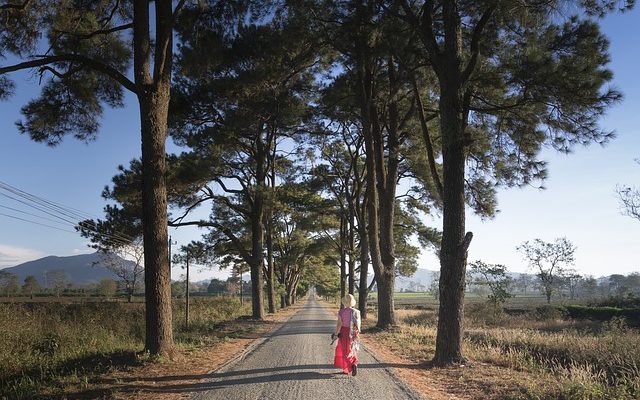‘The Two Trees’ poem and song
‘The Two Trees’ is a poem written by an Irish poet William Butler Yeats. He was inspired by Celtic mythology, and has written the poem in the last part of the 19th century. I wasn’t aware of it until I heard the musical composition of the poem, made by Lorenna Mckennit, an interesting Canadian singer and composer of many songs with mystical themes.
The poem speaks about the two different trees, one which gives fruits of spiritual development, made grown by the ‘looking in ones own heart’, which ultimately gives ‘winged sandals’ to the person, as well as ‘eyes full of tender care’. The other tree is the opposite of development, or one could say, the development downwards, ‘drinking from the bitter glass’, resulting in ‘ravens of unresting thoughts’ and ones ‘eyes growing all unkind’. It is interesting that in both cases the eyes are mentioned as prove of how the person is doing spiritually. There is a saying that says how the eyes are the mirror of the soul, and this is very true, especially for those who can see deeper into the soul through the person’s eyes as a result of spiritual development.
Could the ‘two trees’ be the Tree of Life and the Tree of Qliphoth, from the Kabalistic teachings?
The Kabalistic Tree of Life comes from the ancient Jewish mystical tradition, with roots of the archetype going further back into the past. This tree is representation of both inner and outer Universe, through the ten sephirots, which on the microcosmic level represent parts of ones own Divine Being, and on the macrocosmic level represent dimensional parts of the Universe.
The Qliphotic tree is, on the other hand, the opposite of the Tree of Life; it is its shadow. It represents its negative part with correspondance in the lower dimensions, or the Underworld.”
Those who climb the Tree of Life would climb upwards towards divinity, whereas those who drink of the Qliphotic tree, drink of the bitter glass and are pulled downwards, towards the infra-dimensions.
Whether the poem is about that or not, I cannot say for sure, although it is probable considering the poet’s big interest in Celtic mythology that apparently inspired him to write this poem, and obvious sacred imagery of the two trees. Reflecting on the Two Trees peom, the following question invitably arises:
Which way do you want to go?
Esoterically speaking, would you choose the way of the spiritual awakening through looking within (which is the starting point of the path to salvation)? Or the way of pleasures, which ultimately brings destruction. As someone once said, “Your soul is immortal. Don’t do things which will make it go backwards.”
Here’s the video of the song Cé Hé Mise Le Ulaingt (The Two Trees) by Lorena Mckennit. The title of the sang version means “Who am I to bear it.”
And here is the poem/lyrics:
Beloved, gaze in thine own heart,
The holy tree is growing there;
From joy the holy branches start,
And all the trembling flowers they bear.
The changing colours of its fruit
Have dowered the stars with merry light;
The surety of its hidden root
Has planted quiet in the night;
The shaking of its leafy head
Has given the waves their melody,
And made my lips and music wed,
Murmuring a wizard song for thee.
There the Loves a circle go,
The flaming circle of our days,
Gyring, spiring to and fro
In those great ignorant leafy ways;
Remembering all that shaken hair
And how the wingèd sandals dart,
Thine eyes grow full of tender care:
Beloved, gaze in thine own heart.
Gaze no more in the bitter glass
The demons, with their subtle guile,
Lift up before us when they pass,
Or only gaze a little while;
For there a fatal image grows
That the stormy night receives,
Roots half hidden under snows,
Broken boughs and blackened leaves.
For all things turn to barrenness
In the dim glass the demons hold,
The glass of outer weariness,
Made when God slept in times of old.
There, through the broken branches, go
The ravens of unresting thought;
Flying, crying, to and fro,
Cruel claw and hungry throat,
Or else they stand and sniff the wind,
And shake their ragged wings; alas!
Thy tender eyes grow all unkind:
Gaze no more in the bitter glass.


Reblogged this on PhilippineSpiritualDevelopment.